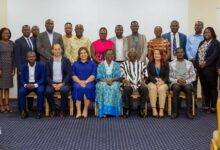When it comes to implementation of social protection strategies to alleviate poverty and transform lives of the socially excluded in Ghana and beyond, the work of the Islamic Council for Development and Humanitarian Services (ICODEHS) is exemplary.
The implementation of its poverty alleviation strategies are phenomenal; impacting numerous lives and bringing hope to the less-privileged, thereby, helping to address issues of inequality in society.
While poverty rates are going down; inequality is rising in the Ghanaian society, raising concerns that there is uneven distribution of resources.
Touched by the dire poverty situations in some communities, Sheikh Mustapha Ibrahim, founded the ICODEHS in 1996 to help reduce the high level of poverty in the society and empower the less privileged.
He has, since been working tirelessly with like-minded organisations and individuals to alleviate poverty and improve living conditions of the poor and needy in society, through reliefs and humanitarian services for sustainable development
Sheikh Ibrahim, the recipient of the Champion of the Order of the Volta (2008) and the Grant Medal Award (2010) has been persuading his development partners, who are being convinced to put their moneys where it matters most-to bring relief to the needy.
Some of the donor partners are Dubai Charity, Kuwait Zakat House, World Islamic League, Turkish Foundation, Qatar Charity Association, Sharaja International Charity, Red Crescent of Abu Dabi, Mohammad Bun Rashid Al-Muktoum of United Arab Emirate, International Islamic Foundation, Islamic Call Society, Muslim World League.
Others are Kuwait Ministry of Awqaf, Qatar Ministry of Awqaf, Sheikh Abdullah Al-Nouri Charitable Society, International Islamic Charitable Organisation, Custodians of the two Mosques in Saudi Arabia.
Through the support of these philanthropic organisations and individuals, ICODEHS’ humanitarian footprints have spread throughout Ghana and into 10 countries in West Africa, putting smiles on vulnerable and needy communities.
The United Nations has declared years 2020-2030 as “Decade of Action”, to remind the global community to fulfill their obligations under the 2030 Agenda for Sustainable Development by addressing inequalities to improve the lives of the poorest, as encapsulated in the global slogan “Leaving no one behind.”
Already, the global agenda has resonated in the works of ICODEHS since its establishment over two decades ago, as reflected in its vision “Creating a world everyone will have access to food, shelter, education and improved well-being.”
“We want to focus much of our interventions in the education sector, lots of brilliant children are left to go stale because of poverty,” Sheikh Ibrahim intimated.
ICODEHS has supported 3,754 orphans throughout the country to better their circumstances: “these orphans who live in their foster homes or single mothers benefit from monthly allowances, medical care, uniforms and books, besides needy students from tertiary institutions also receive allowances.
Additionally, the organisation has constructed 255 school blocks to provide descent and teaching learning environment for underserved communities across the country.
“We have lifted a number of children from poverty to prosperity, many of our children in the orphanage have been educated, some are medical doctors, engineers and they are doing fine,”, Sheikh, who has been named as one of the 500 most influential Muslims in the year 2020 said with pride.
Since its inception over two decades, ICODEHS has implemented many interventions, including providing 2,000 wells and boreholes to make potable water available to underserved and needy communities, contributing to the reduction of water borne disease in such communities.
Besides, ICODEHS has built 1511 mosques dotted across the country, providing descent places of worship for the Muslim communities.
It is also assisting in healthcare delivery, having constructed two clinics through the support of the Kuwait Zakat House at Akweteman and Adenta in the Greater Accra Region, that are providing affordable healthcare to the communities.
Relatedly, it has also been running an outreach healthcare dubbed “Medical Caravan” to underserved communities in the Greater Accra Region and parts of Eastern Region to provide them mobile medical services.
To empower women to be more resourceful, the organisation has initiated the community-led loan scheme for them to undertake small scale projects including palm oil plantation, bakery, sewing, tree planting, tie and dye, mushroom and snail farming.
“Our vulnerable women can now be on their own and are able to take care of their families, we are helping to change and transform the lives of these women” Sheikh said.
As a humanitarian organisation ICODEHS reaches out with kind donations towards the welfare of Muslims and non-Muslims in the country, notably Osu Children’s Home, and occasionally comes to the aid of victims of conflicts in the sub-region.
Annually, it donates food items for needy Muslims to help them observe the Ramadan fasting and the Eid-ul-Fitr and Eid-ul-Adha festivals.
ICODEHS also publishes literature on Islamic religious inheritance, marriage, divorce, funerals and other topical issues to deepen readers’ knowledge on the Islamic religion and other related subject matter.
ICODEHS has braced up to expand its interventions to do more for the needy communities. Among them are constructing more schools to needy communities, entrepreneurship skills training for vulnerable women, leadership training and public speaking skills training for Imams.
It has the plan to set up a university at Tuba, a predominantly Muslim community in the Ga South Municipality of the Greater Accra Region as well as a nursing training school in the Central Region.
By Salifu Abdul-Rahaman



